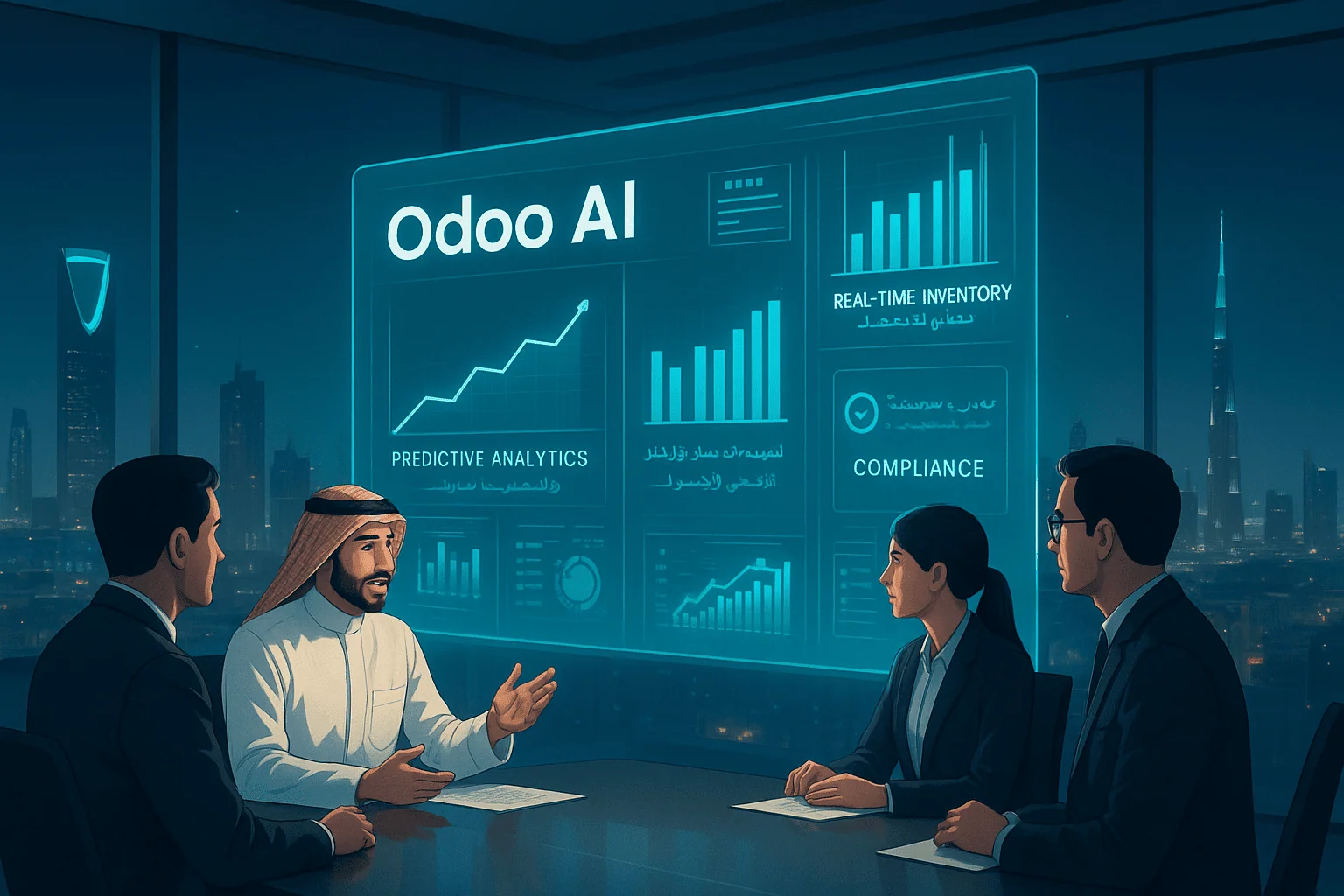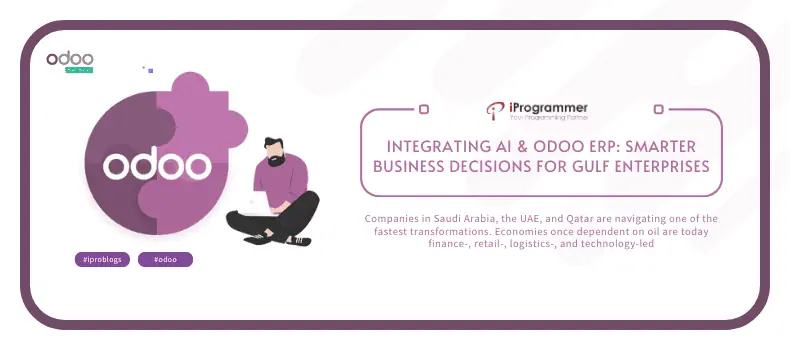Integrating AI & Odoo ERP: Smarter Business Decisions for Gulf Enterprises
Companies in Saudi Arabia, the UAE, and Qatar are navigating one of the fastest transformations. Economies once dependent on oil are today finance-, retail-, logistics-, and technology-led. Diversification brings a new stress: choices need to be quicker, operations leaner, and strategy informed by solid, up-to-date data.
This is where Odoo AI disrupts the equation. Odoo is already an established ERP platform—flexible, modular, and highly trusted across sectors. But when intelligence is added to it, the system transforms from a process manager to a decision enabler. Other than simply tracking operations, it can forecast demand, minimize waste, and reorganize workflows before bottlenecks even arise.
Executives in boardrooms in Riyadh, Dubai, and Doha are asking themselves: How can we automate processes that were once manual without losing control? And how can we incorporate new technologies without disrupting our stable systems? The solution is clear with Odoo and AI: an ERP that isn’t just efficient but predictive and adaptable.
In this blog, we’ll explore how Gulf enterprises can unlock that advantage. We’ll examine the features of Odoo AI, the workflows it automates, the roadmap for integration, and the role of the right Odoo partner.
Legacy ERPs were designed to record and standardize, not to adapt. They provide stability but lack in the Gulf markets of today, where foresight and speed are determinants. Their processes are inflexible, solutions come too late, and enhancements have difficulties keeping up with the pace of transformation.
Saudi Arabian, UAE, and Qatari businesses now confront vastly more intricate requirements. Rules change rapidly, compliance is tighter, and companies must run frictionlessly in multiple currencies and languages. Supply chains intersect oil & gas, logistics, retail, and e-commerce—industries where little inefficiency causes ripples. Under such circumstances, using static ERP systems translates into responding too late.
AI-powered workflows are now business-critical. They allow machines to predict, suggest, and make decisions that previously demanded stacks of human intervention. Rather than waiting for reports, executives receive real-time signals: restock when, risks are surfacing where, or demand is changing how. It is that capacity to predict, not only account, but that also makes businesses competitive.
Odoo makes the perfect platform for this shift. Its modular, open architecture permits businesses to expand at their own pace, uniting finance, HR, supply chain, and customer operations into a single system. Add some AI, and Odoo is not just an ERP—it’s an intelligent decision platform, ready to meet the Gulf’s need for speed, compliance, and responsiveness.
Odoo AI

Odoo is one of the best-selling ERP solutions, loved for its open, module-based architecture. Finance, HR, supply chain, CRM, and e-commerce can be activated or extended as required—giving companies the adaptability that fixed legacy systems cannot. With that flexibility, Odoo is the perfect spot to start AI.
Since Odoo is modular and API-friendly, AI can be added in layers without interruption. A business may begin modestly—applying predictive analytics to sales—or spread intelligence across the organization with automated accounting, intelligent inventory, or AI-based HR. Its open ecosystem translates to easier, faster, and more easily customized integration.
The timing couldn’t be better. AI tools that once felt experimental are now proven and accessible. From machine learning predictions to natural language bots, these technologies can integrate seamlessly into Odoo modules. For Gulf businesses under the gun to act fast, this maturity offers the chance to leapfrog rivals: making ERP go from a system of record to a system of intelligence.
Features of Odoo AI: What Enterprises Can Unlock
1. Predictive Analytics for Sales & Demand Forecasting
Odoo AI-based models can consider historical sales information, seasonality, and market signals and forecast demand with greater precision. For Gulf retailers who are forecasting during peak-demand shopping seasons or construction firms tendering for new projects, this information avoids overstocking or understocking by allowing resources to be directed perfectly.2. Automated Accounting & Fraud Detection
AI-powered accounting software reconciles invoices automatically, identifies discrepancies, and rules out manual errors. In Gulf financial hubs, where regulatory compliance is high, this reduces both cost of operations and risk exposure as well as enables real-time reporting.3. Smart CRM: Lead Scoring & Churn Prediction
Sales teams can even score leads with AI scoring models and detect early warning indicators of customer churn. For growth-oriented businesses in Dubai or Doha, this translates into improved conversion rates and increased customer lifespans without bloated sales costs.4. HR Automation & Employee Sentiment
From CV screening to skill gap identification, AI in Odoo’s HR module reduces recruitment time by a large extent. Sentiment tools also give Gulf employers intelligence on workforce morale, which is extremely pertinent in industries like oil & gas and logistics where retention is critical.5. Supply Chain Optimization
Odoo AI can analyse delivery data, fuel prices, and delivery times to suggest ideal routes and stock levels. It ensures smoother operations in economies where supply chains are global and high-volume.How Odoo AI Automates Workflows
One of the largest direct benefits of Odoo AI is the automation of repetitive, time-consuming work. By injecting intelligence into daily workflows, companies free their employees up for more worthwhile decisions with less error and delay.
1. Invoice Reconciliation
Manual reconciliation tends to drag accounting cycles. Odoo AI is capable of reading, categorizing, and matching bills against payment records or purchase orders automatically. For the finance team in Saudi and UAE businesses, this reduces closing cycles and supports compliance with changing reporting standards.
2. Inventory Restocking Triggers
AI systems monitor demand patterns and create automated replenishment triggers. In retailing or logistics centres such as Dubai and Doha, this keeps shelves and warehouses full without holding capital in excess stock.
3. Contract Approvals with AI Document Reading
Procurement and legal teams waste hours poring over contracts. Odoo AI can review documents, flag deviations from regular terms, and send them for approval. In oil & gas or construction, where contract volumes are large, this lowers risk and speeds up project schedules.
4. Chatbots for Customer Support
Integrated AI chatbots respond to regular customer questions directly within Odoo’s CRM module. For Gulf e-commerce and service providers, this provides round-the-clock support in multiple languages at lower call-centre expense while enhancing customer satisfaction.
5. IoT Integration for Gulf Industries
In refining and logistics industries, Odoo AI bridges with IoT sensors to track machine condition, fuel levels, or shipment status. Predictive automated triggers can trigger maintenance or reroute cargo, preventing costly downtime in global-repercussion industries where delays can be prohibitively costly.
The Roadmap: Integrating AI in Odoo ERP
Adding intelligence to Odoo isn’t a one-time switch. Gulf businesses that pursue it strategically realize quicker returns and less disruption. There is a clear map that ensures AI enhances, not complicates, ERP operations.
1. Assess Enterprise Goals
The first step is clarity. What problems should AI solve? A Dubai-based retailer might emphasize demand forecasting, whereas a Saudi-based oil & gas company might target predictive maintenance. Defining outcomes prevents scattershot adoption.
2. Select Relevant Odoo Modules
Odoo’s modular architecture lets businesses begin small. Sales, Accounting, Inventory, or HR may be installed separately, with AI features stacked where they provide the most added value. The modularity lessens risk and enables phased growth.
3. AI Plug-ins or Custom Model Integration
AI can be included via preconfigured plug-ins or custom models. Preconfigured solutions fit typical applications such as invoice matching, whereas custom models are used for industry-specific requirements like supply chain optimization in Gulf logistic centres.
4. Data Training & Migration
AI is just as good as the data that supports it. Clean, orderly migration from legacy systems is essential. Training models with Gulf-localized data—currencies, languages, and regulatory standards—ensures precision and relevance.
5. Continuous Optimization
AI systems mature. Periodic monitoring and adjustment ensure suggestions remain keen as market conditions change, regulations are updated, or new modules become available.
The risks of cutting corners are high: poor data preparation or rushed integration could lead to compliance failures, misleading projections, and wasted funds. That’s why it is critical to recruit an experienced Odoo partner in Saudi, UAE, or Qatar. With the right expertise, enterprises don’t just “install AI”—they create an intelligent system that scales with growth, adapts to regulation, and strengthens competitive edge.
Industry Use Cases: Odoo AI in Action
The impact of Odoo AI comes alive when applied to real-world Gulf industries. Here are four practical use case examples:
Use Case 1: Retail (UAE) – Personalized Promotions
- Challenge: UAE stores experience spikes in demand around Ramadan, Eid, and tourist season. Traditional promotions resulted in stockouts or expired discounts.
- Solution: Odoo AI analysed purchase history, browsing data, and customer demographics within CRM and Sales modules. Personalized promotions were triggered automatically.
- Result: Conversion rates increased, inventory remained balanced, and marketing spend was better utilized.
Use Case 2: Oil & Gas (Saudi Arabia) – Predictive Maintenance
- Challenge: Refinery and drilling operation downtime is costly and dangerous, but traditional ERPs monitored breakdowns only after they occurred.
- Solution: IoT sensors inputted equipment data into Odoo AI. Predictive models highlighted anomalies, planned maintenance, and notified teams prior to failures.
- Result: Downtime declined, safety improved, and maintenance costs lowered due to preventive intervention.
Use Case 3: Logistics (Qatar) – Route Optimization
- Challenge: Qatar logistics providers coordinate thousands of shipments across the Gulf, and manual planning resulted in fuel inefficiency and delayed deliveries.
- Solution: Odoo AI coupled with fleet data to recommend best routes for delivery based on fuel prices, timelines, and current traffic patterns.
- Result: Improved delivery times, enhanced fleet efficiency, and lower fuel consumption—increasing profitability directly.
Use Case 4: Banking & Finance – Fraud Detection & Compliance
- Challenge: Gulf financial institutions were facing rising compliance regulations and the need for real-time fraud protection. Manual verification was time-consuming and prone to loopholes.
- Solution: Odoo AI observed transactions in real-time, detecting anomalous behaviour and automating compliance audits.
- Result: Accuracy of fraud detection improved, audits sped up, and customer trust became enhanced.
Gulf companies compete in one of the globe’s most dynamic markets—diverse, globalized, and heavily regulated. To thrive, they need systems that provide speed, accuracy, and responsiveness. Odoo AI provides that edge. It automates tedious tasks, improves compliance, and allows more informed decision-making at scale. Finance departments close books sooner, supply chains predict outages, and customer operations cost less and are more accurate.
In contrast to traditional giants such as SAP or Oracle, the contrast is extreme. Theirs are systems that are robust but inflexible, expensive to implement, and slow to respond. Odoo’s modular, open-source architecture facilitates AI integration as easier, scalable, and much more affordable. The total cost of ownership (TCO) is considerably reduced—without a compromise in capability. To Gulf businesses that must weigh dizzying expansion against stringent regulation, this flexibility is critical. With Odoo AI, ERP becomes a system that anticipates—costs less, remains compliant, and puts businesses ahead of the competition.
AI + ERP integration is too important to take a chance. One wrong move—data migration, model training, or module setup—can result in compliance issues, wrong insights, and lost investment. That’s why the right Odoo partner is just as crucial as the technology.
Things to consider when evaluating a partner:
- Certification & Proven Expertise
Make sure that the partner is certified and has an established record of applying Odoo AI in businesses like yours—retail, logistics, oil & gas, or finance. - Customization Capability
Gulf businesses tend to require customized workflows: multi-currency, multilingual, and regulation based. The partner should customize Odoo modules to these conditions and not use one-size-fits-all solutions. - Integration Skills
From sensor-enabled IoT in refineries to chatbots based on AI in customer support, integration is key to success. Seek a partner with robust experience in integrating Odoo with external tools and platforms. - Local Presence + Offshore Support
Ground-level knowledge in Saudi, UAE, and Qatar is crucial for compliance and responsiveness. - Ongoing Support & Optimization
AI models evolve. The right partner provides continuous monitoring, retraining, and module upgrades to keep your ERP future ready.
Odoo ERP was always adaptable; with AI, it is revolutionary. What used to have to be done manually—forecasts, compliance, machine monitoring—is now pre-empted and automated with accuracy.
For businesses in the Gulf, the shift is a pressing priority. Those that are adopting Odoo AI now have faster decisions, lower costs, and increased flexibility in retail, oil & gas, logistics, and finance. In a region characterized by high growth and international competition, that advantage is the difference.
ERP is no longer back-office software—it is the foundation of the intelligent enterprise. With Odoo’s modular design and AI integration, businesses can scale innovation without the heavy costs of traditional systems.
iProgrammer is a global leader in delivering intelligent business solutions at the intersection of AI and Odoo ERP. As a trusted Odoo partner in Saudi Arabia, the UAE, and Qatar, we bring certified expertise and a proven track record of implementations across retail, logistics, oil & gas, and finance.
Our strength lies in crafting strategies tailored to Gulf enterprises—ensuring compliance, scalability, and measurable ROI. Backed by our team of certified Odoo partners in India, we combine local market knowledge with offshore delivery excellence, offering clients both responsiveness and global support.
With iProgrammer, enterprises gain more than technology—they gain a partner committed to making ERP the foundation of smarter, future-ready decisions. Learn more about our Odoo expertise.









